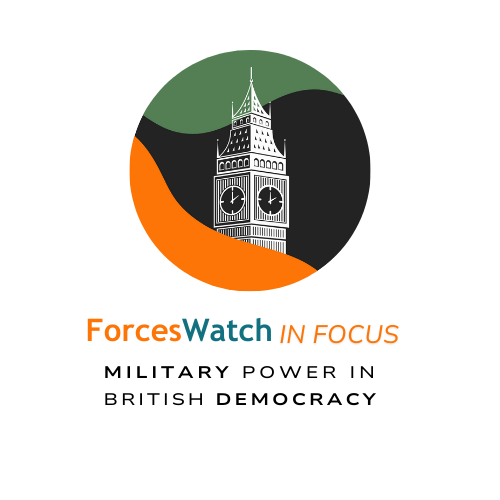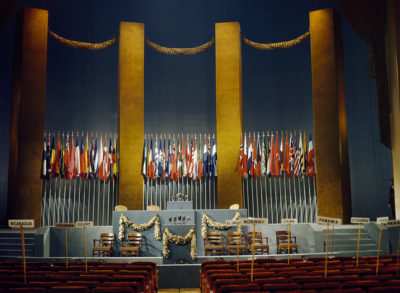A back door to Parliament for defence contractors: mapping arms company influence in APPGs
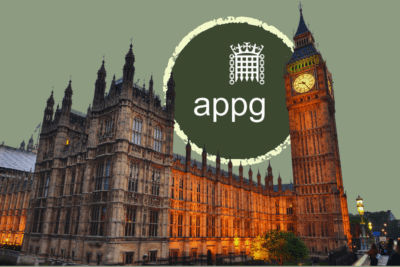
Since its inception in 2010 the All Party Parliamentary Group for the Armed Forces has been one of the least transparent of APPGs. Here, we lay out what we know – about its activities, sponsorship by the arms industry and the criticism it has received in the past. While the Armed Forces APPG is yet to reform since the general election we look at how defence companies continue to be involved in other parliamentary groups.
Formed after the general election that gave us the Conservative-Liberal Democrat coalition, the All-Party Parliamentary Group (APPG) for the Armed Forces was, according to its long-time chairman James Gray, the largest APPG in Parliament during its early years, with a membership of more than 300 MPs and Peers. It was formed by the merger of previously separate APPGs for the Royal Navy, Army, RAF and Royal Marines, entities we know little about due to the lack of historical records on APPGs.
Whilst Gray was among the Conservatives MPs who lost their seat in July 2024, his legacy – which also includes over a decade at the helm of the Armed Forces Parliamentary Trust – it is clear his influence was huge, even if, as we outline, much of the APPG’s work remains shrouded in secrecy.
It could be argued that APPGs are a particularly British political entity. They consist of members from both Houses of Parliament, who join together ‘to pursue a particular topic or interest’ ranging from jazz to aerospace or Zoroastrianism. Whilst they operate in a space of ambiguity that means they have barely been kept in check by light-touch regulation, additional scrutiny in the past few years has lead to tighter rules following concerns around their lobbying potential. And, whilst they can use a modified version of Parliament’s famous portcullis logo, because they are not official parliamentary bodies they must avoid presenting themselves in a way which leads them to be confused with parliamentary select committees.
That said, many APPGs have been extremely open about what they do. Not so the APPG on the Armed Forces. It reported the minimum required by the threadbare rules governing APPGs, and did not have a website, as a lot of APPGs do. In starting our research, all we initially had to go on was the one sentence description detailed in the Register of All-Party Parliamentary Groups: ‘To promote better understanding of Her Majesty’s Armed Forces in Parliament’. But, by piecing together fragments from parliamentary sources, social media platforms, and news articles, we have been able to build a picture of the APPG – albeit a limited one that leaves many questions unanswered. As is the case with such a lack of transparency, the door is left open for speculation on whether the APPG has been a vehicle for the undue influence of commercial interests.
Early doubts
Not long after the formation of the APPG in 2010, the Guido Fawkes website published a blog calling into question the aims of the group. The blog, which had access to the minutes of the meeting in which the APPG was inaugurated, highlighted how its members had accepted an offer from the UK Defence Forum (UKDF) to provide support for the APPG, with the UKDF effectively becoming the APPG’s secretariat. Guido’s main concern was that the UKDF was run by Robin Ashby, who:
‘… was subject to an expose in the Indy two years ago [2008]. It was revealed that this defence lobbyist had a pass sponsored by a Lib Dem peer. He was subsequently stripped of the pass. That didn’t stop him getting another one from Lord Moonie in 2009. Again this was exposed, this time by the Telegraph and for a second time he was stripped of that pass. He now has a third pass, this time through the back door of an APPG of which Lord Moonie holds the purse stings.’
It went on to explain how Robin Ashby owned a lobbying firm called Bergmans, which, according to The Independent, was doing work on behalf of more than a dozen large defence and aerospace companies. In response, Ashby told Guido Fawkes that he ‘is more of a hobbyist than a lobbyist’ and doesn’t get much more than his expenses paid by the UK defence industry.
The blog also linked to a copy of the inaugural meeting minutes it referenced and, interestingly, Labour’s Chris Bryant was listed among the attendees. The long-standing MP for Rhondda would later go on to become Chair of the Commons Committee on Standards, the parliamentary body charged with overseeing changes to APPGs, and held the post when the Committee launched its October 2020 inquiry into APPGs exploring concerns they could be used as vehicles for corporate and foreign influence.
Among those who gave evidence to the inquiry was the Registrar of Consultancy Lobbying, who stated that in broad terms: ‘an organisation is engaging in consultant lobbying if they communicate on behalf of a paying client with a government minister, permanent secretary or their equivalents.’ This means, he said, that some support providers – such as those providing secretariat services – for APPGs need to register as consultant lobbyists, whether or not they consider themselves lobbyists.
However, there is an issue in that the legal obligation to comply rests with the consultant lobbyists rather than the client (the APPG). The Registrar added that he is ‘concerned that lack of awareness by APPG support providers of their obligations’ could ‘lead to breaches of the law’. Whilst the legislation that led to these obligations only came into force in 2014 – around the time the UK Defence Forum ceased to be named as a secretariat for the APPG on the Armed Forces – there are definitely questions about whether it would have been governed by these rules.
That the UK Defence Forum received funding from the arms industry, however, should be in no doubt. The Forum’s now archived website claimed that it was grateful for various contributions that ‘made the full range of our range of activities possible since our foundation in 1996’. Those listed as contributors include many of the world’s largest arms companies: BAE Systems, Boeing, Finmeccanica, General Dynamics, Lockheed Martin, MBDA, Northrop Grumman, Raytheon and Rolls-Royce. It goes on to state that these supporters did not have, nor sought to have, influence over the Forum’s activities. Equally, as outlined below, we have not been able to find any evidence that money donated to the APPG for the Armed Forces by arms companies was used to pay the UK Defence Forum for the administrative duties it performed.
The curious case of Robin Ashby
Transparency International UK (TIUK) also gave evidence to the 2020 Committee on Standards inquiry, pointing out that ‘APPGs are a well-known route for lobbying activity’ and that external organisations providing support ‘are a corruption risk’. To back up their point, TIUK referenced then Conservative MP Douglas Carswell’s claim, to a similar Committee on Standards inquiry in 2013, that some APPGs were front organisations for trade companies and companies seeking contracts. Carswell was particularly concerned that defence sector APPGs operated this way. In fact, Carswell referred specifically to the APPG for the Armed Forces:
‘The secretariat is the UK Defence Forum. Who fronts the UK Defence Forum? It is a giant front organisation for defence contractors.’
‘Before I came here, I did a quick look down the list, and I cannot help noticing, for example, one very reputable All-Party Group, the All-Party Parliamentary Group for the Armed Forces. What can be better than an organisation that claims “To promote in Parliament better understanding of the UK’s Armed Forces”? It sounds very good, until you look at who the secretariat is. The secretariat is the UK Defence Forum. Who fronts the UK Defence Forum? It is a giant front organisation for defence contractors. They are not neutral players in this.’
When asked by the Committee Chair if he was making an assumption that members of the APPGs and MPs are ‘doing as they are told’, Carswell replied: ‘I cannot help noticing, Mr Chairman, that I get emails from the mailbox account of a number of parliamentarians that have been written by the man who runs the UK Defence Forum.’ That man, of course, was Robin Ashby.
Ashby is an interesting person to research. Beyond the UK Defence Forum and the misdemeanours that led him to have his parliamentary pass revoked, he made many a media appearance during the 2007-08 financial crisis after he formed the Northern Rock Smallshareholders Group, ran industry association Eurodefence-UK – with an ex-Director of French arms company Thales and a former head of the now defunct Defence Manufacturers Association, and currently sits on Newcastle City Council as a Liberal Democrat.
Arms industry funding
The UK Defence Forum has not been involved with the APPG for the Armed Forces for some time and, whilst we have been unable to ascertain exactly when and why this involvement stopped, there is no mention of the UKDF or Robin Ashby from 2014, although it continued to be involved with the APPG for Defence and Security Issues until the end of 2019. The point of contact for the APPG was subsequently the office of James Gray MP. However, what remains constant for the APPG is the money it receives from the defence industry.
According to our calculations, between September 2010 and May 2024 – when the APPG for the Armed Forces last appeared on the register – the group received at least £834,265 in donations.
The Register of All Party Parliamentary Groups, where APPG membership and funding is published, only keeps records publicly available for 7 years. Using the Wayback Machine we have accessed figures from as early as September 2010, although we have been unable to verify if we have complete data for the registers released between that date and November 2014. According to our calculations, between September 2010 and May 2024 – when the APPG for the Armed Forces last appeared on the register – the group received at least £834,265 in donations.
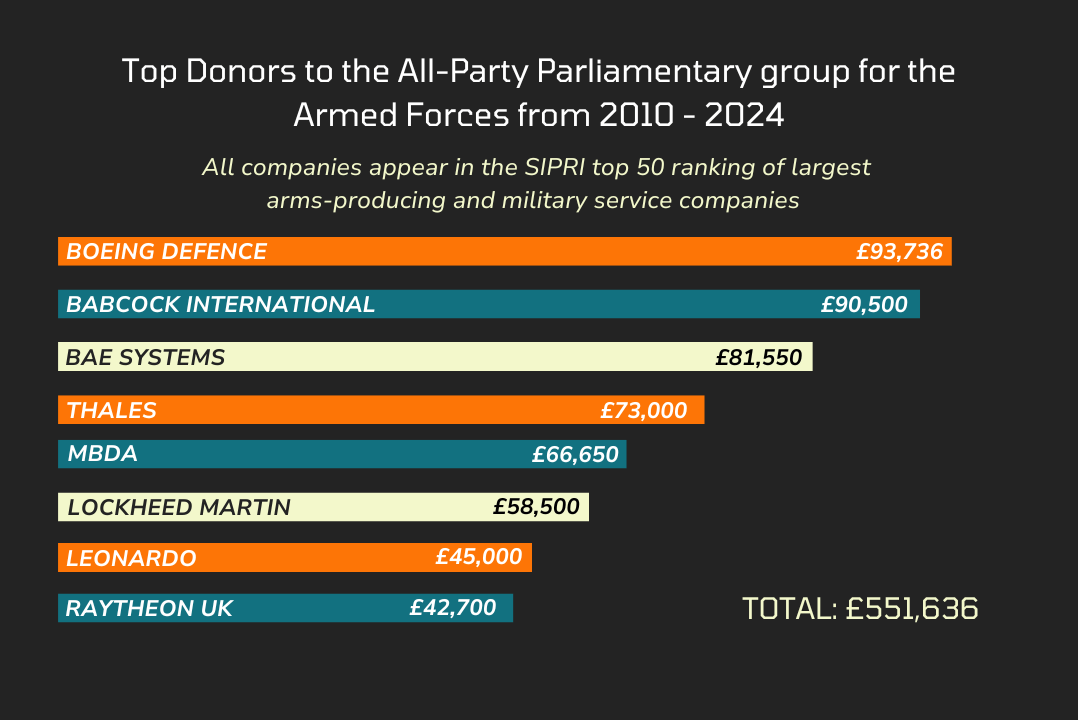
The eight largest defence industry donors gave over half a million pounds to the APPG for the Armed Forces during its existence. The group received at least £834,265 in sponsorship during that time.
Save £10,000 from PriceWaterHouseCooper across 2018 and 2019, and £2,500 from communications company MCI in 2016, some early donations from Inchcape Shipping, and a sprinkling from MoD training contractor CAE, the donor list is a whose-who of the global arms industry. Babcock, BAE Systems, Boeing, Thales and MBDA are the top contributors, but with BAE forming part of the MBDA consortium their donations arguably amount to more than any. Other notable donors include Lockheed Martin, Raytheon (now RTX), Airbus and Leonardo (and its previous incarnation Finmeccanica).
People we have spoken with during the course of this research say the consistent nature of the funds from defence contractors – both the specific amounts and the yearly payments – suggest they could be a subscription fee. Such subscriptions are not unheard of with APPGs, although they are normally made explicit via an APPG’s website. And they are perfectly within the rules. In their 2022 report, the Committee on Standards stated: APPGs ‘may include non-parliamentarians as external members, and may charge them a subscription or membership fee, but they must not have voting rights; these fees or subscriptions can be used by the APPG to cover the costs of its activities, including, for example, paying for its own secretariat.’
Subscription fee or not, we do not know exactly what the money is spent on. Through analysis of MPs recorded expenses and parliamentary events data we can make an educated guess that the bulk of the income covers breakfast and dinner briefings for MPs and Peers. House of Commons event data shows that the APPG for the Armed Forces hosted 172 dinner, lunch and breakfast briefings, plus a small number of other events, between August 2014 and July 2023. However, the number is likely greater because meetings moved online in 2020 and 2021 due to the Covid-19 pandemic. The House of Commons historically recorded the number of people in attendance at each event, but from August 2015 to July 2023 this stopped. For the period between August 2023 and July 2024, when attendance reappears in the data, the number of people at APPG briefings ranges between 36-60. With each dinner costing around £45 per head, and breakfasts coming in at circa £14, it starts to add up.
Assessing the total number of briefings in this period is also complicated because, curiously, between July 2017 and August 2022 all mention of the APPG for the Armed Forces disappears from the events data. Concomitantly, we see regular mentions of breakfast, lunch or dinner briefings hosted by the Armed Forces Parliamentary Trust (AFPT) – often booked by the same MPs who were previously booking APPG for the Armed Forces briefings. We have assumed that these events are one and the same thing when calculating the number of briefings held by the APPG.
Perhaps in confirmation of our assumption, events data from August 2022 to July 2024 shows James Gray booking rooms under the AFPT to host APPG events. Our reporting (here and here) on the AFPT and the scheme it runs annually to inform parliamentarians about the military – both little known outside of parliament – indicates that this organisation also gives arms companies access to MPs and peers.
Picking through fragments
It is more difficult to get information on who, exactly, attends these briefings alongside MPs, and it is even hard to know which MPs attended. The only way we have of knowing if an MP attended is if they record it in the Register of Members’ Interests, where parliamentarians have to record their expenses and gifts over a certain price threshold. However, as the cost of an individual breakfast or dinner is lower than that threshold, we only know an MP attended if they went multiple times within the recording period.
Unsurprisingly, its chairman, James Gray, was someone who consistently attended enough briefings to surpass the threshold. For 2023 we also see Jane Stevenson (Con), Robert Butler (Con), Robert Courts (Con) and Tan Dhesi (Lab) registering the hospitality or donation of breakfast and dinners from the APPG in the Register.
Confirming the blurred lines between the APPG and the Armed Forces Parliamentary Trust, House of Commons events data shows a booking that day for an APPG Breakfast Briefing which was booked by the AFPT.
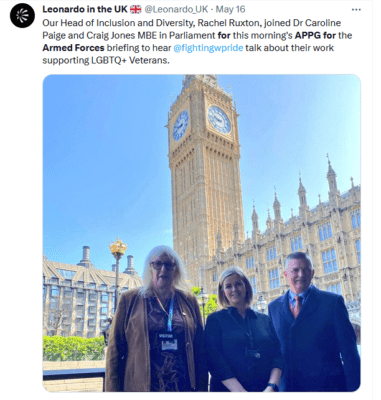 It is similarly difficult to know what happens at these briefings. However, picking our way through social media posts, we have gleaned a few pointers. In a 2023 Twitter post from Leonardo UK, the company’s Head of Inclusion and Diversity was pictured with Caroline Paige and Craig Jones, from the charity Fighting With Pride, ahead of an APPG briefing Paige and Jones gave on their work supporting LGBTQ+ veterans. Parliamentarians attending the event were also given briefing papers, a photograph of which was posted by the Labour MP Navendu Mishra. The event was also attended by Leonardo UK.
It is similarly difficult to know what happens at these briefings. However, picking our way through social media posts, we have gleaned a few pointers. In a 2023 Twitter post from Leonardo UK, the company’s Head of Inclusion and Diversity was pictured with Caroline Paige and Craig Jones, from the charity Fighting With Pride, ahead of an APPG briefing Paige and Jones gave on their work supporting LGBTQ+ veterans. Parliamentarians attending the event were also given briefing papers, a photograph of which was posted by the Labour MP Navendu Mishra. The event was also attended by Leonardo UK.
Confirming the blurred lines between the APPG and the Armed Forces Parliamentary Trust, House of Commons events data shows a booking that day for an APPG Breakfast Briefing which was booked by the AFPT.
This blurring also provides context to a comment made by the DUP’s Jim Shannon back in May 2019, in which he talked about the work of the Armed Forces Parliamentary Scheme (run by the AFPT) – ‘including the dinners that it hosts’ and ‘those who sponsor’ them. He goes on to say how at ‘those events we gather knowledge and we get a sense of the importance of those companies to all the regions of the United Kingdom’. Our research suggests that Shannon is likely talking about the APPG for the Armed Forces here, as opposed to the Armed Forces Parliamentary Scheme. This would certainly chime with a comment on the LinkedIn profile of John Gardner, Babcock’s ex-Group Head of Government Relations, who said he advanced the company’s ‘reputation and interests by establishing targeted networks with key Parliamentarians, their Select Committees and All Party Groups’.
A LinkedIn post from the Royal Navy Strategic Studies Centre in early 2024 also mentions an APPG breakfast event for the launch of their ‘Maritime Britain in the 21st Century’ project, whilst a 2021 article in the military journal Wavell Room mentions an online meeting by the APPG to discuss a report on ‘The Wider Value of the British Army’ by the Oxford Economics group.
Beyond events, the Register of Members’ Interests shows us that members of the APPG for the Armed Forces have gone on a number of ‘study tours’ of military cemeteries in Bosnia & Herzogovenia, Monte Cassino, Italy and the Netherlands. Whilst it is not clear if the costs were covered by the regular donations outlined above, the tours were funded by a combination of Lockheed Martin UK, CAE U.K. and Clarion.
The APPG for the Armed Forces has yet to reappear on the registers of APPGs published since Labour’s victory. But that does not mean arms companies are not funding other APPGs.
Defence involvement in APPGs since July 2024
Whenever Parliament is dissolved for an election, all APPGs are disbanded and have to go through the process of reforming once a new government is in power. At the time of writing, the APPG for the Armed Forces has yet to reappear on the registers of APPGs published since Labour’s victory. But that does not mean arms companies are not funding other APPGs.
As well as sponsoring the APPG for the Armed Forces during the previous government, registers for early 2024 show that defence companies were among those directly involved with APPGs on Apprenticeships, Manufacturing, AUKUS, Engineering as well as the Environmental, Social and Governance APPG. The latter has recently been rebranded as a ‘parliamentary liaison group’ and therefore now falls outside of the new transparency requirements placed on APPGs. At the end of the last parliamentary term, the AUKUS APPG – about the security agreement between Australia, the UK and the US – received £15,000 a year from both BAE Systems and Babcock, and its secretariat was provided by ADS (see below), although these sponsors have not been relisted in the new register.
Figures highlighted by Peter Geohegan’s ‘Democracy for Sale’ blog show that, despite the tighter rules imposed on APPGs, ‘lobbyists pour[ed]’ £700,000 into them in the first few months of the new parliament particularly ‘Fossil fuel firms, the vaping industry and weapons manufacturers’. BAE Systems and Babcock are in the list of donors paying Connect Public Affairs more than £54,000 to act as the groups secretariat for the Apprenticeship APPG. Babcock also has an input via Policy Connect who currently support the Manufacturing APPG. The Engineering APPG has sponsorship from, among others, engineering companies – Rolls Royce, Thales and Safran – which also make significant profits from defence.
The defence industry has also been strongly linked to recent APPGs through the ADS Group, an industry body representing the aerospace, security, defence and space sectors. As well as providing support for the AUKUS APPG (see above) ADS was the secretariat for the Aerospace APPG and is now one of the organisations giving Tendo Consulting a total of £19,501 – £21,000 to act as secretariat for APPG on the Future of Aviation, Travel and Aerospace. ADS are also continuing to act as the secretariat for the APPG on Space, an arena fast emerging as a new frontier for public and private defence interests.
Will the APPG for the Armed Forces re-form?
With the regulatory changes to APPGs in the last parliament, there was a considerable thinning out of the groups. Particularly relevant for our inquiry are the additional requirements placed on APPGs with over £1,500 income that an external and neutral chair of the AGM is appointed by the Speaker, and an annual report and due diligence statement are published. It seems that sponsorship of these behind-the-scenes groups by commercial interests is not finished but perhaps finding new forms. We wait to see if this means that the APPG for the Armed Forces will regroup. And we will continue to track how defence companies proceed with their involvement with other parliamentary groups.
January 2025 update
The Register of APPGs published on 2 January 2025 shows that the APPG for the Armed Forces has now been re-established. Its first meeting – an AGM – took place on 21 November last year. The APPG’s four officers include three military veterans – Alex Ballinger (Labour MP for Halesowen and Chair of the APPG), Paul Foster (Labour MP for South Ribble) and Ben Obese-Jecty (Conservative MP for Huntingdon). The latter two, and the fourth officer of the APPG Amanda Martin (Labour MP for Portsmouth), represent parts of the UK with strong links to the defence and aerospace industries or the armed forces. All four were new to Parliament in 2024. The APPG has not yet registered any income so has not triggered the additional transparency requirements for APPGs with over £1,500 income a year.
See more: military in society, UK Parliament, arms industry, democracy
Like what you read?
> Sign up for our newsletter or blog notifications
> Support our work – from just £2 a month

